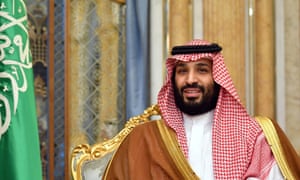
By Madawi al-Rasheed– All is not well in the House of Saud. On 7 March, Mohammed bin Salman, the young crown prince and future king of Saudi Arabia, boldly dispatched his masked security personnel to bring two of Saudi’s most senior princes, Ahmed bin Abdul Aziz and Muhammad bin Nayef, to the palace after a hunting trip in the desert. It’s still unclear whether they have been detained for short-term interrogations or to be imprisoned. What’s certain is that Prince Mohammed’s decision was a preemptive strike to intimidate those who have dared question his leadership style from inside the royal household. Although Mohammed is the crown prince, he plays the role of king. He remains in control of all economic, political, social and foreign relations, and eclipses his father, King Salman, as unofficial ruler of Saudi Arabia. The arrests were ordered after the royal court was passed details of an alleged plot to undermine Prince Mohammed’s ascendance to the throne. Among the two princes he arrested, Ahmed is the most eligible to become king – he is the only remaining brother of the incumbent King Salman and would have been first in line had his brother not promoted his own heir, much to Ahmed’s chagrin.
Still, a fully-fledged palace coup is unlikely: Prince Mohammed controls the security, intelligence and military capabilities of the kingdom. No other prince can mobilise enough troops to march on the palace and depose a man with the coercive powers of the state at his disposal. It’s more likely that the detained princes were planning on withdrawing their support should Mohammed become king. In order to ascend to the throne, he will seek the bay’ah, the oath of allegiance given by the most senior princes represented in the 33-member committee of allegiance that was established by King Abdullah in 2008. Both Ahmed bin Abzul Aziz and Muhammad bin Nayef are members of this committee, and Prince Mohammed likely knows they won’t rush to offer their support. Though the young prince doesn’t technically need the bay’ah’s seal of approval to become king, he will be isolated without it – and his rule will lack the legitimacy essential for a smooth succession. Further arrests will offer no protection against this leadership crisis. Prince Mohammed finds himself at the centre of a struggle that began with his predecessors. Successive kings have ruled Saudi Arabia as their own private fiefdom, denying Saudi citizens the right to any role in the country’s domestic and foreign affairs. The Saudi royal family has pushed back against demands to transform the absolute monarchy into a constitutional one, with an elected national assembly and government that could deal with power vacuums and leadership struggles within the royal household.
Had Saudi kings accepted a constitutional transformation of the monarchy, issues of succession could have been resolved without resorting to the arrests of rival princes. In Kuwait, for example, an independent national assembly votes on succession, mitigating against bitter monarchical rivalries. Though the prince built his reputation as a young moderniser, garnering favour among the western media as a monarch who could free Saudi Arabia from the shackles of religious conservatism, economic stagnation and a state-controlled economy, his idea of progress was always two-faced. Prince Mohammed allowed women to drive while presiding over the arrests of women’s rights activists and the criminalisation of feminism. He promised religious reforms and social liberalisation while detaining hundreds of religious scholars, activists and intellectuals.
The young prince silenced debates inside the kingdom and pursued his critics abroad. The brutal murder of journalist Jamal Khashoggi was the final stroke in shattering his international reputation, while his decision to pursue a disastrous war in Yemen has embarrassed his western allies, which continue to sell arms to Saudi Arabia. But his propaganda abroad and deployment of thinktanks that promote his interests abroad and launder his reputation among a western political elite, ensured that he remained the preferred candidate of Donald Trump. His other western allies, above all Britain and France, turned a blind eye to the prince’s scandals as he continued to promise them investment and arms sales. When faced with a choice between trade or sanctions, western governments opted for the former – remaining silent over Saudi Arabia’s record on domestic repression, its war in Yemen and the fracturing of consensus among Gulf countries following Saudi Arabia’s dispute with Qatar in 2014.
The current leadership crisis is a clear sign that the future of reform in Saudi Arabia remains ambiguous at best. Without a consensus over his reforms and foreign and domestic policies, Prince Mohammed has resorted to repression. As the young prince attempts to tighten his hold on power, we can expect more arrests to follow. • Madawi al-Rasheed is a visiting professor at the London School of Economics’s Middle East Centre and the author of Salman’s Legacy: The Dilemmas of a new Era in Saudi Arabia.



